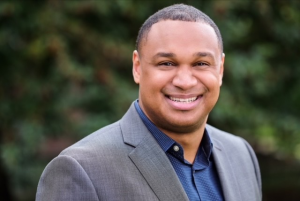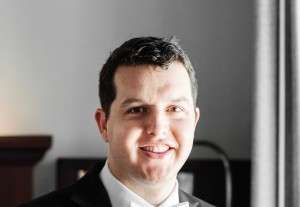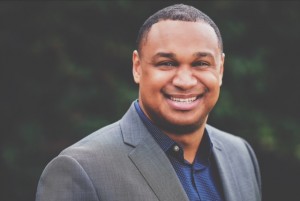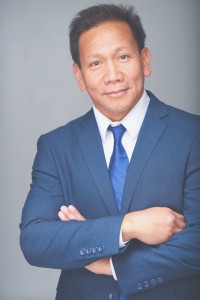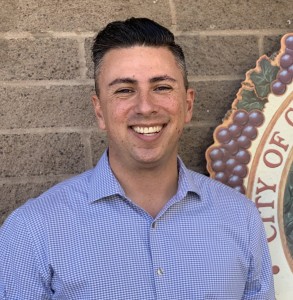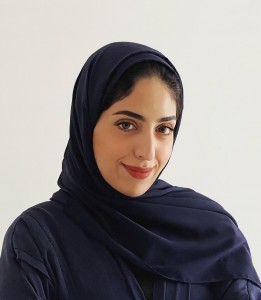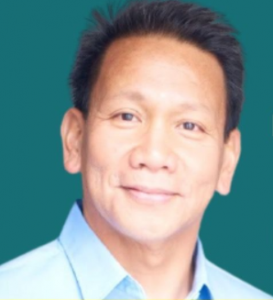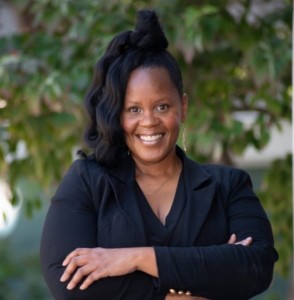
- From the biographical page about your life and career, I noticed that you have held several public service positions throughout Ventura County. What initially interested you to serve in local government?
I ran for city council in 2018 and won by a landslide. As a mother, educator and public servant I represent working families. As a woman – a black woman, I represent a new and diverse perspective in leadership. I am the first black person ever to be elected to council (male or female) since the city’s inception 150 years ago.
Public service is definitely a calling to serve. Ever since I was a young girl, I knew I wanted to do this, I just never thought I would have the opportunity to do it in the city I grew up in!
Serving as an elected official in the city I grew up in was a culmination of a decade of community work and career experience. My campaign tagline read, “The Qualified Choice.” I was well prepared for the complexities of office and my education was key.
I was a part of the MPPA programs first ADEP cohort in 2006. Dr. Herbert Gooch, Dean of the MPPA program reached out to me and personally requested that I apply to the pilot ADEP program. He was confident that even whilst in my final undergraduate semester I could begin working on my graduate studies at the same time, so I did. I studied under professors who either became elected officials or were appointed public servants such as Jeff Gorell, Jeff Burgh, and Sandy Smith. I completed this program in two years and graduated in 2009.
During the program I improved my writing skills, further developed my critical thinking skills and began a paid internship with a local municipality, in Community Development. I used this opportunity to demonstrate my ability to improve procedure, process and participation in city government programs, based upon what I learned. After graduation I was asked to remain with the department.
CLU not only gave me an education but helped me create a pathway into one of the most exciting careers I could have imagined. This began my career in public service and this sentiment extended to elected office. Five years later I ran for political office.
I knew I had what it took and I also knew I had to convince others to believe in me even more than I believed in myself. I ran for office three times and the VC Reporter published that the third time was the charm.
I had a solid background in economic development and working experience with public budgets and elected officials. I knew I could be that balanced voice in the midst of competing priorities. I expressed that I would model accountable leadership, work towards consensus and agreement and find sustainable solutions to help move the city forward. This is what I have done and will continue to do.
We, as women, sometimes believe we do not quite measure up or qualify for positions we are overqualified for. Women all over the country at every level have proven to be effective leaders and I am no different – you are no different.
I continue to learn by challenging myself, constantly stretching my normal ways of thinking and getting out of my comfort zone. This is one step of many in becoming a leader.
As a councilmember I was happy to encourage potential students to consider CLU their institution of choice in furthering their education, when they hosted a recruitment event at Ventura City Hall.
I was honored to be a panelist for CLU’s virtual Women in Leadership event in 2020 through the Centers of Non-profit Leadership
As a single-parent I put myself through college while raising my boys. I did not know anyone who had blazed the path that I wanted to go on so I carved my own path by learning from great African American public figures, such as Barbara Jordan, Colin Powell, Donna Brazille, Willie Brown, Bell Hooks, Cornel West and many others. I decided that I would embark on the journey to political office because I was able to envision myself doing so through the stories of others. During my undergraduate studies, even as a single parent I also had the opportunity to participate in campus life as a CLU Ambassador and Managing Editor of the campus newspaper, The Echo.
CLU taught me that my voice, whether welcomed or not, was valuable. Through their diversity course requirements I witnessed the best and worst of shifting paradigms and narratives. Some instructors were quite vocal about their apathetic view of the requirement and allowed students to openly heckle any attempt at challenging their ideas of status quo – unfettered. This to me (as one of very few other black students) was a form of classroom terror. They were arguing that black American contributions didn’t matter, asking why they should have to learn about them and insisted their parents were against it because that’s not what they are paying tuition for them to learn.
“Because we are here!” I thought, “…and because we are you!…your blood runs through our veins” I screamed silently, and “Because there is no America without the work of black slaves.” “Because we are not a silent slave class anymore to be seen and not heard.” “Because we are citizens of these United States, because we fought in every war on both sides, because we nursed your children, because we cleaned your houses, because we are humans that seek acceptance just as outlined in Maslow’s Theory, because black history is American history that was simply left out and we don’t deserve to be left out and ignored any longer!” I was shocked and appalled that I had to sit and accept such attacks without any protection or explanation. I was unable to articulate my frustrations so clearly through my rage. So from that point forward, I used my written voice to add power, balance the narrative and challenge the status quo. Every paper I wrote was testament to my perspective that I created specifically to shift the perspectives and direction of thought for my professors and the students. I believed that no other black student should have to be subject to what I was subject to.
When people ask me why I ran I tell them that ever since I was a young girl I was challenged with a deep seated sense of injustice when I learned that my successful business-minded cousin was set-up and put in jail by his local Sheriff’s department in the South. They sent the message that a black man dare not try to do better than anyone else, lest they be knocked down. I learned indirectly by that tragedy, that wanting more, being a business owner and potentially making more money than others put a target on your back. I was devastated. I decided that I wanted to be the person that provided real legal representation for men like that. I dreamed of being an attorney while he remained locked up my entire life. Later, I realized that I did not need to be an attorney to effect policy or to legislate. There are many roles each of us can play in pushing a shift in our justice system – but we must do it together.
Long before 2020, injustices have paralyzed this country…whether those injustices are racial, social, judicial, economic…
The viral killing of George Floyd was the virtual straw that broke the collective back of America and ignited a movement for Black Lives that I never believed was possible. As a black woman and mother of three beautiful black men, I feel as if I am in a fight for their lives. That they might live and not be shot in the back, that they may find love and not be choked until they cannot breath, that they might be afforded the right to work hard and not be unemployed and homeless. We continue to fight today. I don’t want to see the face of my son crying out from YouTube one day saying “Mother! They are going to kill me!” That is what George Floyd represented to me, the face of every black man, son, father, uncle and brother. I will not sit idly by. I will fight. The question is will you? Will you sit idly by? Will you fight?
During their pre-adolescent years, I did “The Talk” with my boys and coached them how to handle any interactions they had with law enforcement or rogue neighborhood residents and prayed they remained safe. Even doing all of that, I knew that once they became adults, they would face increased challenges compounded by lack of permanent full-time work opportunities, lack of affordable housing, lack of financial stability, lack of practical workplace protections and security, lack of mentorship, lack of responsive healthcare, …and the list goes on. I became the most resolute advocate for my children.
As advocates, women, as people of color, we must continue to fight to be heard, to insist equity in representation, to be taken seriously, to be allowed to speak frankly, matter-of-factly and unapologetically about issues of great importance without being accused of being labeled too serious, aggressive or angry, to be allowed to have an opinion all our own without having that opinion appropriated by someone else and deemed valid only by association, to be forced to question if you belong because you look and speak differently…
On council, my presence alone has ushered in a culture of change, a live example of progress, while establishing that a black woman can not only lead but lead successfully. I was elected by a constituency who saw me for who I was, not the color of my skin. I was able to identify the common thread that unified me with my community. This is what we must dig deep and try to do more frequently. My story is one of victory, not defeat, because the fact that I was elected is a testament to Ventura’s willingness to do something different.
I petition students, as they embark on their careers and seek to find purpose in their work to consider that true equity lies in Equity Bridges. We must be a part of the solution to build these bridges, in education, which means making all basic utilities accessible to all. Today the internet has become a basic utility and should be available, at no charge to students and parents of students, in leadership, by sitting on boards, and decision-making tables, in political office, as a candidate running for office and or in campaign management, in access to entry level jobs and careers with living wages, in housing and the safety of our children so we have some say in how we live, and in shifting paradigms, by understanding implicit bias, roots of racism and the truth about the politics of power.
To do this each individual must understand how to leverage the knowledge they have, develop long term strategies for personal progress with the intent to partnering and collaborating with others.
I am glad to see that CLU has expanded its Diversity initiative to Equity, Diversity and Inclusion, but we need to do more, because faith without works is dead. A resolution with no teeth means nothing. An idea without a strategy to implement is just a dream.
- From your point of view, what aspects of public service are most challenging and most rewarding?
Being a councilmember in the City of Ventura is both challenging and rewarding. It is challenging because the work never ends and you must be constantly on top of what is coming next. The Ventura council is considered a “part-time” elected position, which means you must keep your day job. There is no salary and we get no staff. So we keep our own calendars and arrange our own meetings and must navigate complex policy issues on our own.
In addition, this was compounded by the fact that there was a real lack of strategic economic development initiatives in the city. Social policy cannot exist without a means to fund it. This is a point I would regularly drive home on the dias. It was quite challenging at times to beat back against old narratives, indirectly educate my colleagues on the effects Proposition 13 and the end of Redevelopment had directly on city services and our budget. I have been present to help find options we have available to us today to create solutions. I leaned on my experience in Economic Development, I continued to support business, was in favor of much-needed infrastructure projects, reviewed policy that required updating and made sure I had time to listen to the people that elected me.
As former co-chair of Finance, Audit & Budget committee, I was the catalyst that assisted staff in locating a savings of over $400,000 during the pandemic when the city lost over $11 million under our projected budget, when everything shut down and helped frame the recommendations as presented to council during our complex budget discussions. As current chair of the General Plan Committee I work closely with Community Development and our GPAC consultants to ensure that as we plan for the city the next 20-30 years we get it right and that everyone’s voice in the community contributes to the conversation. I continue to build relationships with property owners, consultants and concerned community advocates to be sure that the policy we create is balanced.
It is rewarding because I have been able to utilize everything I have learned up until this point to the benefit of the City of Ventura.
- With the growing political divides and inefficiency seen in the federal and local governments, many have lost hope in politicians and our political system. How do you engage with and respond to disillusioned community members with similar political doubts or concerns?
In my perspective, the political divides were always there but hidden, just not so blatant. Coupled with a tumultuous federal administration, the pandemic demanded a captive audience that was ignited to take their frustrations to the streets. The year of 2020 carried a storm on all fronts. On council, we were required to legislate every issue, listen to all concerns and create new solutions that no one seemed to totally agree on.
There have been inefficiencies in my local government for an extend amount of time and the best any politician can do in the face of polarizing politics is to remain responsive, remain true to the values they stood on when elected and remain present for every difficult discussion, and that is what I have done. In addition, I have brought voice to communities who have not had the opportunity to really engage in local government in the past. I lived up to this commitment when I insisted that the GPAC make special provisions to reach out to the Latino community which makes up almost 35% of our population and is growing, yet represented less than 5% of the appointed members on the GPAC. This was unacceptable. In addition, I was confident that my vote was the right one. to appoint a very qualified and educated woman from the Latino community to fill a vacant council seat earlier this year.
When I was elected in 2018 I was a part of the first female majority on council. This was historic all by itself but I was also a part of the first group of councilmembers elected by districts. Today I am in good company, with two Latinas serving on the dais with me. This was made possible because two years prior to my election, I joined CAUSE in challenging the city’s at-large election process in 2016 which effectively led the city to move to vote for the city charter to allow for district elections. District elections are what opened wide the door that only had a narrow opening. I protested through civil discourse at a council meeting to help push the city towards more fair and equitable representation. Up until that point almost all councilmembers elected were from the Westside of the city, were usually male, white, retired and over 70. The two white females on council at that time were also retired, white and over a certain age but also only two of twelve other females since the city’s inception. There were stark political divides between me and many of my colleagues but I worked hard to “work across the aisle.”
As the first black person ever elected, I wanted this to mean something. Not just that I shook things up but that I worked with other councilmembers to find solutions. I worked with the Police Chief, the Mayor and my colleagues to introduce a resolution that addressed racism and police brutality in 2020. This resolution requested action not just ceremony. It was a resolution Declaring Racism a Public Health issue and Denouncing Police Brutality. I also wrote a Black History Month proclamation February of 2021. In December of 2019, council approved a new initiative which we are calling the “Progress Initiative,” to be brought to the council Fall of this year. Among other things, it has provisions in it to get more of the community involved in city leadership. It has been quite rewarding to have colleagues willing to stand with me and vote for change, especially during the year of 2020.
- In what ways do you believe your unique personal and professional background helped create your campaign and garner support from local citizens? What was your experience like running for local government?
I did an extensive amount of volunteer community work, in addition to my education and public service in local government and was a candidate for political office three times before I won.
I graduated from the Ventura County Leadership Academy Class X back in the early 2000’s, I later graduated from Gamaliel National Leadership Institute’s organizational leadership training, took CAUSE’s Values Based Leadership Training, completed the year-long political leadership training with Emerge California and even transformed my thinking through Landmark corporate leadership training, but before all of that I volunteered as Community Coordinator for the county NAACP chapter. All these organizations enhanced the development of my unique perspective as I matriculated through my undergraduate and later graduate studies. I have an Associates degree in Bilingual Cross-Cultural Studies with an Emphasis in Latin culture and language, I have a Bachelor’s degree in Communication with an emphasis in Journalism and a Masters degree in Public Policy and Administration.
I grew up in Ventura and as a native I had a birds eye view of the state of the city, I saw how anti-growth initiatives affected the city over the last 25 years, saw retail centers deteriorate and become the blighted buildings they are now, witnessed the lack of economic development initiatives on the eastside, the underutilization of redevelopment and watched helplessly as no affordable housing was built in the city.
It is not just your professional experience that makes what you bring to the table valuable. I have lived and experienced many of the challenges and frustrations that many residents express to us; I know first-hand the degree of difficulty faced in the city when searching for housing, maintaining rent while facing underemployment and healthcare challenges. My experiences have put me in the unique position to be able to contribute to policy conversations from an informed position with understanding and empathy.
Being a mother and matriculating through CLU as a graduate student taught me commitment and grit. This has served me well professionally. Running for office was a five-year commitment to a long-term goal. It was a political experiment in progressive movement, it was an exercise of grass-roots power and a glass-ceiling shattering story about a girl who wanted to navigate her way into political life.
It did not come without sacrifices, heartache and long days and nights with no sleep. It did come with a satisfaction that I had run the race and did all I could do, and in the end the Lord carried me the rest of the way through. I did not always believe that I deserved to be there but now that I am here, I know better. Not only do I deserve to be here, I know now that I am an asset.
- Do you feel that your CLU degree in public policy helped prepare you for those roles? If a fellow MPPA student were interested in running, what advice would you give them?
CLU definitely sharpened my focus and fortified my resolve. The Public Policy program enhanced my critical thinking, improved my writing skills, convinced me that urban planning was not a dirty word, reinforced the idea that I could create my own path, demonstrated that it was possible to be a Christian and relevant professionally, fostered the idea that everyone finishes and graduates and taught me that doing the work, showing up and being present is the recipe for progress and ultimate success. Because I am a critical thinker, the two classes that had the most impact were a social science class and an ethics class. I learned not to be afraid of my ideas even if they were different from the instructor who was teaching me. I learned to forge forward even if I was going it alone. I learned how to effectively design sustainable solutions where none have ever existed. These things have been invaluable in my role and to my knowledge I am the first MPPA student from CLU’s ADEP program, to ever be elected to office!
My advice to MPPA students is:
You are on the front lines of policy research and solutions, study those concepts that are relevant to your future, double-down on the values important to you and at the same time, keep an open mind and listen. Right now, really research those theories being challenged that stand to directly affect you, while you have the time to do it, such as the Critical Race Theory.
Today, I encourage students to learn more about the Critical Race Theory, to understand how systems of racism oppress and elevate at the same time depending on who you are, where you are from and what you look like. Economic Development, Urban Planning, Redlining, access to education, blighted communities, gentrification: they are all social constructs that support a way of living and philosophies on who deserves what. How do you want to live, how do you want your children to live, what do you deserve? Should someone else be able to define for you what access you get? Do you deserve to live in the community you grew up in? Should affordable studios, lofts and small apartments be available to those with entry level jobs? Should young families be forced to move to another state? Is it okay to make a playground out of poor communities? Should those who don’t have a political voice get poisoned water and breathe polluted air?
These are questions we must be able to answer to effect change or to have a drive and purpose.
It is important to remain true to your purpose. Find your focus, even if it feels you are only muddling through at times. It does all come together in the end. Take the time during matriculation to identify your authentic self, your story and your reason for staying your chosen course. This will serve as your compass that points you to that ultimate goal when you get lost and discouraged, because you will. It also informs your purpose which in turn can give anything you do authenticity, and authenticity can carry a business, provide strength during uncertain times and take you to the finish line. Just remember, when you get to the finish line, it is really just the beginning – not the end.
I paid my dues, but what I want students to know is that, it is not required to do all the things I did to be qualified. There will always be those who are much less qualified sitting right next to you. I remember an instructor telling me once that I should never feel intimidated or unworthy to sit at a decision-making table because my perspective was unique from theirs and therefore was needed and valuable to the conversation. That was life changing and I have carried that with me throughout the years. Believe it and walk confidently into your future.

